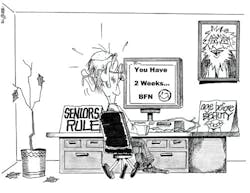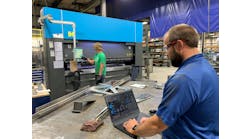Greg: When I told Jim Cahill, Emerson's social media manager, about the feature article I was doing in this issue, "Talk to Each Other," he introduced me to Steve Elwart, the director of systems engineering at Ergon Refining Inc. Steve has an extraordinary combination of practical technical and communication knowledge.
Stan: What is the generational history at Ergon Refining?
Steve: The refinery was built in 1974. Since this was Ergon's first refinery, 18-22 year old auto mechanics, carpenters and other trade people were hired to staff it. They did not know they were not supposed to be able to run a plant. Now these guys are the experts. (I came along in 1985.) About six years ago, we began to be concerned about a flood of retirements to pursue the popular activities of hunting and fishing, but the economic turndown postponed this problem. Now the concern is more about how to integrate the younger workers into the existing work force. We are five to 10 years behind in generational turnover seen in the refining industry, but we have seen explosive growth in the company, with a corresponding increase in staffing requirements. We don't hire mid-career. We hire co-ops and graduates. They are the Millennial Generation (18 to 30 years old). Some of their mothers are younger than I am. There are big differences in lifestyles and vernaculars. This was the big motivation for me getting an advanced degree in communication.
Stan: What are some of the distinguishing characteristics of the co-ops and new hires?
Steve: Multi-tasking is a natural behavior. They are not seeing the value of relationships. They are not as likely to initiate extensive one-on-one conversations, leaving the more experienced wondering why they don't come to seek help. Communication is concise. They tend not to have sense of reasonableness of scale. For example, when they see a digital temperature, they get hung up on a hundredth of a degree, not realizing the sensor was only good to two degrees.
Kids raised by helicopter parents may think they are always winners, expecting praise for everything they do. When I told a co-op of serious mistake he made, his mother called and complained I did not praise her son enough for trying. Quick positive feedback is expected. In one Duke University study, work received was immediately filed without comment, acknowledged or shredded. The reaction for the work being filed was about as negative as for the work being shredded.
The "here and now" is most important. When Millennials or the next generation asks what time it is, they don't want to know how to build a watch. The expectation is achievement and zero risk.
Creativity is less due to need for immediacy and zero risk and the attitude, "If you can't Google it, it is not real." Decisions are "three bids and buy," foregoing the development of relationships and a more in-depth understanding.
Everything is viewed as free and open source. You don't need to give credit or reference. The foregoing of recognition and the brevity of communication and the scarcity of conversation can be inadvertently construed as rudeness. What is rude to one generation is not to another.
Greg: I wish some people would be more in the "here and now." When I talk to people older than me, they seem to catch at best a few scattered words. The words are more often in the middle or near the end. Young people I know are attentive in person, but expect email to be as short as a text message. I was perplexed why a web support person's solution had no relationship to the problem I explained in an email. I had to keep reiterating the problem in a series of email messages. I finally figured out the person was only reading the first sentence of my email. How do you make email more effective?
Steve: I start the email with the motivating lead followed by the request. For more complex issues, especially where there is a misunderstanding, disagreement or mistake, verbal one-on-one conversations accomplish much more. [I prefer to have them] in person, but if necessary, by phone.
Stan: How do you see the grade level progression of the various generations?
Steve: Now 38- to 42-year-olds may have a younger boss. Gen Y is passing up Gen X in promotions. The Harvard Business Review blog, "Don't Dismiss Your Gen X Talent," indicates that while Gen X talent is the key to the success of most companies, Gen Xers are being leapfrogged by Gen Y and blocked by Boomers, who are now delaying retirement.
Greg: Maybe Gen Y's greater interest in quick results, sustained effort, flexibility, mobility and the desire to move up is leading to more promotions. What are some of the key characteristics of Gen X that companies need to recognize?
Steve: Xers are more interested in craft and have less loyalty to the company than Boomers. When a web guy was asked to do databases, he said no because it was not his thing. Gen X saw boomers get RIFed (Reduction in Force) and feel a sense of betrayal. Gen X will work like a dog if the work is interesting, but at the same time they are more concerned about a balance between work and life. Xers may turn down a new position offering 10% more in pay if there is significantly less free time. Gen X may not be willing to move to a new location. Xers value relationships more and take a longer view than Millennials.
Stan: Large companies in the process industry have a technical ladder where a person more interested in the continuing development of technical expertise can advanced in grade level without having to go into management. At Monsanto and Solutia, a Senior Fellow had the same grade level as a director. A Distinguished Fellow had no grade level limit. There were many more presidents and vice presidents than Distinguished Fellows, so the track was rather narrow. Still it was inspiring for the geeks like me and Greg.
Greg: The Fellow program was particularly fortunate for me because early aptitude tests indicated that last thing I should do is get into management. I think the conclusion had something to do with my answer to the question "Would you like to lead a cavalry charge?" and my greater interest in discovery than money. I also had the luxury of picking and choosing in engineering technology what research, development and applications to pursue and the encouragement to publish. At age 66, realizing my time left is rather limited, I am more into optimization. To the surprise of many companies, I have turned down lucrative contracting jobs with great people and interesting applications because the depth of knowledge gained and long-term benefit to the profession was missing in action. I am doing my best to achieve an optimum, taking into account what is really important and what I can offer that is unique. My goal is to develop and communicate a deeper understanding of process control technology and people and the human condition. Besides doing the next editions of some books and a new book on batch control, I am finally going to do a non-technical book I had on the back burner. I have not heard at end of their life anyone say "I wish I spent more time on the job."
What are the characteristics of Boomers like you and me?
Steve: Boomers have more loyalty to the company and are willing to assume many different roles. For example, one Boomer's career progression was from chemist to shift foreman to plant manager to vice president of human resources to safety program leader. Boomers and older Xers are "change agents." They are not risk-adverse. They understand there is risk with anything, and that your job is to mitigate risk rather than think you can achieve zero risk. They realize that being right eight out of 10 times is better than three out three.
Stan: How do we help the Millennials and the next generation get the skills and knowledge they need, given that they are best-positioned for a leadership role and to take advantage of new technology?
Steve: Boomers and Xers need to take the initiative. They need to start the conversations and communicate effectively. They need to provide the knowledge and encourage the behavior needed to go beyond the immediate and below the surface. They must create and foster relationships with suppliers of hardware, software and services. Expertise captured in software is not as much the total solution as envisioned. The potential in the software can go largely untapped. Boomers and Xers must show that relationships inside and outside the plant are key.
Greg: The knowledge and capability in today's software is incredible. Software has advanced considerably as a tool to help get the most out of an application and prevent potential problems, as discussed in the June Control Talk column "The Route to Model Predictive Control Success." The important realization here is that the software is a tool, and there is still great value in the expertise of the people employing the tool.
An extensive effort to put expert systems in the control rooms in the 1990s were plagued with miserable failures. The expert's knowledge did not readily fit into simple rules of logic to guide operations. The benefits were spotty at best. False or confusing alerts were extremely damaging in terms of the perception of the value of the system. The troubleshooting of the order of execution was difficult and branching of these rules was not decipherable, despite the most advanced software. When the expert was left, the system was inevitable turned off. In my experience the benefits accumulated was less than 10% of the company-wide cost.
What can information technology (IT) do to help?
Steve: Unfortunately the first reaction by IT to new technology is "No." As a result CD, DVD, Internet access, cell phones, smart phones, tablets and the cloud were all initially banned. Eventually technology wins, but progress is delayed. There is more technology at home than in the work place, and this can frustrate younger workers. Millennials will buy the latest and make an end run around IT. This was one reason BYOD (bring your own device) has made such inroads into the workplace.
People want to carry their stuff with them and stay connected. People get upset if a text or email is not answered within an hour, no matter what the time. People can be working on fun stuff 24/7. The line between work and pleasure is getting blurred. The only way to catch up with some of the younger workers is by LinkedIn and Facebook. IT should manage and leverage, rather than ban new technologies.
Stan: What are the best ways to communicate knowledge?
Steve: Boomers are accustomed to instruction manuals. Millennials prefer short 5- to 10-minute videos. Each video should be limited to three concepts. The videos can snap together like Legos. For presentations, you pull in the pieces. The videos don't need to be professionally done. A video can be shot in a kitchen with a dog wandering in and out. They can be as raw as Gonzo journalism.
Pictures provide an analogy and generate interest, but can be too captivating, not releasing the viewer to the subsequent content. If the presentation is too cool, the audience may be more interested in the presentation technology than the message. It is better to go simple.
"Top Ten Emails You Don't Want from Your Boss"
(10) I don't see why not.
(9) Everything is "no problem."
(8) You have a life-long career here. LOL!
(7) Did you see the YouTube video of you on your sick day?
(6) You are fired – JK
(5) You are a great performer. It's just that your performances are too long and dated – IMHO.
(4) You have been virtualized.
(3) Your expertise is in the cloud.
(2) On file clean-up day we cleaned out your office.
(1) You have 2 weeks – BFN.







